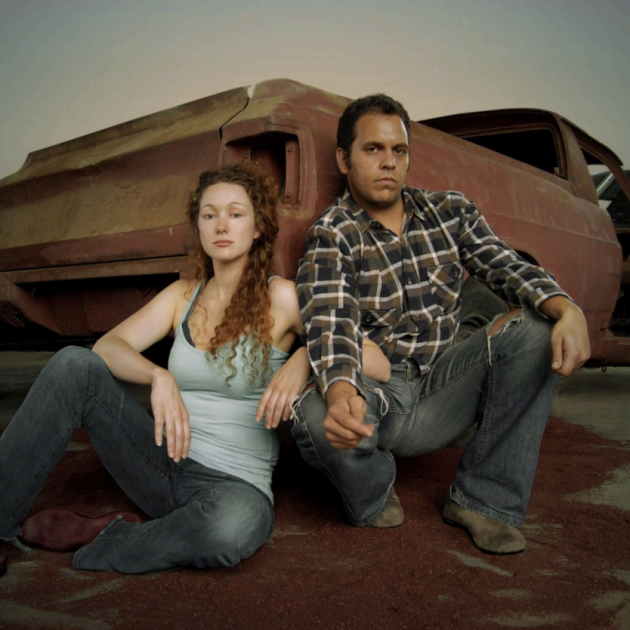
Romeo and Juliet
At Wharf 2 The SYDNEY THEATRE COMPANY EDUCATION present ROMEO AND JULIET. The text has been edited to play even less than “the two hours traffic” the Chorus tells us about in the original. It has been edited for 8 actors and maybe too slimly to do justice to Shakespeare. He has however weathered centuries of this abuse, so not to blame or worry too much.
On a red dirt floor with a ubiquitous, deteriorating ute and a middle height wooden tower (it was presumably, once a water tower- I’m guessing that design detail,- and not just a convenient acting Balcony for Juliet?!!!!! ) the concept is to place it in Outback Australia. You then people it with a multi race / indigenous cast. The Design concept is cursory and the application in the production reveals itself to be grossly superficial. Tokenistic and not developed with any insightful rigour. Since the Production concept is proscriptive the casting for suitability and skill may become a problem. What should follow? Maybe a rethink? Or is the idea too temptingly politically-cosy?
The best acting comes from Ursula Yovich as the Nurse, intelligent, warm; Lucia Mastrantone as Mercutio, quick (sometimes too quick) witty and physically deft; and Michael Habib as Capulet, strong clear and supportive. The rest of the cast is hopelessly inadequate to the task. The principal acting concentration for the others is speaking the words clearly. Storytelling, character, and character relationships do not enter the stage. There is in this production no Warring Houses, merely mildly choreographed backyard disagreements. (There is a knife). Worse still there are no star crossed lovers. Romeo does not seem to be in love with Juliet (except in some grinning doltish way) and certainly this Juliet when she looks upon her Romeo does not love him, and worse maybe, she doesn’t even like him!!! (I wondered if she actually saw him, since no matter what offer the actor offered she proceeded with her responses as if in a bubble.) If there is not that sexual chemistry there is no TRAGEDY. Issac Drandich as Romeo is not able to deal with the complicated technical demands of the writer to be fluent or connective as character. Sophie Ross has some technical armoury but there is no inner warmth, or theatrical insight or empathy for Juliet .When she comes to the two great Aria-monologues, (“Gallop apace you fiery-footed steeds…” and later “Farewell. God knows when we shall meet again…”) the bench marks for an actor’s qualities, she takes them at too fast a pace and as a relatively private rumination. It is a technical task. The emotional given circumstances and the emotional discovery and journey in the speeches are forfeited and the character loses her empathetic opportunities and the audience is left puzzled and divorced from the action. This young actress, who may have potential, needed guidance.
I had to decide whether to be so specific in this probe. WHY? Why I am is, because I can take the Casting Director and the Director to 10 or more coffee shops or bars and introduce them to a number of actors, who will give them a menu (!!!!!), who would have given their lives for the chance to investigate these characters. Was the Production Concept too restrictive in casting choices? Should it have been altered? (It is subsequently so shallowly explored, anyway?) When does the Artistic Aesthetic of the Company come into Action? I would be upset if this were just an ordinary production for a general public BUT since this is a production of the EDUCATION WING of the STC and that it was aimed at schools and young audiences, to give them a performance that did not give the play or the actors a better chance to succeed is an outrage. A scandal perhaps.
At the 20/20 discussions I attended for the Government Plans for the Arts, EDUCATION was the first priority. If this were a High School production with High School actors I would be justly proud of the choices. But this is THE SYDNEY THEATE COMPANY. The Company’s investment to developing future audiences lies here. Where is the long term vision in these choices or is it just the short term political comfort of this concept that needs to be nurtured? I believe that here is where the Company’s resources need to be most vigilant. It should not be some sop to government policy but the very raison d’etre for the Organisation.
Will these audiences want to see live performance ever again? Do they think Shakespeare is boring or irrelevant to their lives still? (Will they pass their exams?) I think after watching this production I know the answers, therefore let me help: If you want emotional content see ZEFFIRELLI’s film. If you want political and contemporary context see LUHRMANN’s film. If you want some textual feel for language see CUKOR’s film (maybe). But beware the Educational context of THE SYDNEY THEATRE COMPANY’S EDUCATION production of Romeo and Juliet. Discuss.
2 replies to “Romeo and Juliet”
Kevin – really enjoying your blog.
Thanks
Kevin,
The STC’s Shakespeare education shows have always been terrible.
I think the structural problem with this programme is that they demand [to meet the perceived needs of schools] the play be cut to 90 minutes and constrict the number of actors to 8 [I think].
Sometimes I decry the appointment of inexperienced directors who apply some ‘big idea’ to the production and distort the play to the point that the story and relationships become confusing [both of their Macbeths for example]. But mostly it seems that the STC just don’t value the event artistically and try to milk the cash cow for all it’s worth.
To serve the students it seems to me requires a very simple staging that foregrounds the relationships, the language and brings vitality to these stories.
Thanks for your forthright blog.
Noam
Comments are closed.